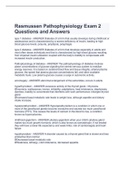Rasmussen Pathophysiology Exam 2 Questions and Answers type 1 diabetes - ANSWER Diabetes of a form that usually develops during childhood or
adolescence and is characterized by a severe deficiency of insulin, leading to high blood glucose levels. polyuria, polydipsia, polyphagia.
type 2 diabetes - ANSWER Diabetes of a form that develops especially in adults and most often obese individuals and that is characterized by high blood glucose resulting from impaired insulin utilization coupled with the body's inability to compensate with increased insulin production.
Pathophysiology of diabetes - ANSWER The pathophysiology of diabetes involves plasm concentrations of glucose signaling the central nervous system to mobilize energy reserves. It is based on cerebral blood flow and tissue integrity, arterial plasma glucose, the speed that plasma glucose concentrations fall, and other available metabolic fuels. Low plasma glucose causes a surge in autonomic activity.
acromegaly - ANSWER abnormal enlargement of the extremities. occurs in adults
hyperthyroidism - ANSWER excessive activity of the thyroid gland- >thyroxine
ØInsomnia, restlessness, tremor, irritability, palpitations, heat intolerance, diaphoresis, diarrhea, inability to concentrate that interferes with work performance; enlarged thyroid gland
ØIncreased basal metabolic rate leads to weight loss, although appetite and dietary intake increase.
hyperperathyroidism - ANSWER Hyperparathyroidism is a condition in which one or more of the parathyroid glands become overactive and secrete too much parathyroid hormone (PTH). This causes the levels of calcium in the blood to rise, a condition known as hypercalcemia.
childhood gigantism - ANSWER pituitary gigantism when your child's pituitary gland makes too much growth hormone, which is also known as somatotropin. if not treated they will have a lower life expectancy and weak limbs. risk of cardiomegaly and heart failure
hypothyroidism - ANSWER A disorder caused by a thyroid gland that is slower and less productive than normal
ØDecreased basal metabolic rate
ØWeakness, lethargy, cold intolerance, decreased appetite ØBradycardia, narrowed pulse pressure, and mild/moderate weight gain
ØElevated serum cholesterol and triglycerides
ØEnlarged thyroid, dry skin, constipation
ØDepression, difficulties with concentration/memory
ØLoss of eyebrow
Menstrual irregularity
primary hypothyroidism - ANSWER Hashimoto's disease (causes your immune system to mistakenly attack your thyroid) fatigue, lethargy, sensitivity to cold, depression, muscle weakness.
secondary hypothyroidism - ANSWER low TSH low levels of T3 and T4
myxedema - ANSWER occurs in severe or prolonged hypothyroidism.
ØGeneralized, non-pitting edema
ØDecreased level of consciousness, hypotension, hypothermia, history of precipitating event (trauma, sepsis, certain drugs)
ØMay progress to myxedema coma, a life-threatening condition if treatment not received
graves disease - ANSWER primary hyperthyroidism removal of thyroid
Amenorrhea - ANSWER absence of menstruation
In primary amenorrhea, menstrual periods have never begun (by age 16), whereas secondary amenorrhea is defined as the absence of menstrual periods for three consecutive cycles or a time period of more than six months in a woman who was previously menstruating.
Addison's disease - ANSWER occurs when the adrenal glands do not produce enough of the hormones cortisol or aldosterone
adrenal gland failure
cardiogenic shock - ANSWER A state in which not enough oxygen is delivered to the tissues of the body, caused by low output of blood from the heart. It can be a severe complication of a large acute myocardial infarction, as well as other conditions. -
tachycardia, loss of consciousness, low BP
end-stage renal disease - ANSWER The final stage of kidney failure (as that resulting from diabetes, chronic hypertension, or glomerulonephritis) is marked by the complete or nearly complete irreversible loss of renal function. Nausea.
Vomiting.
Loss of appetite.
Fatigue and weakness.
Sleep problems.
Changes in how much you urinate.




